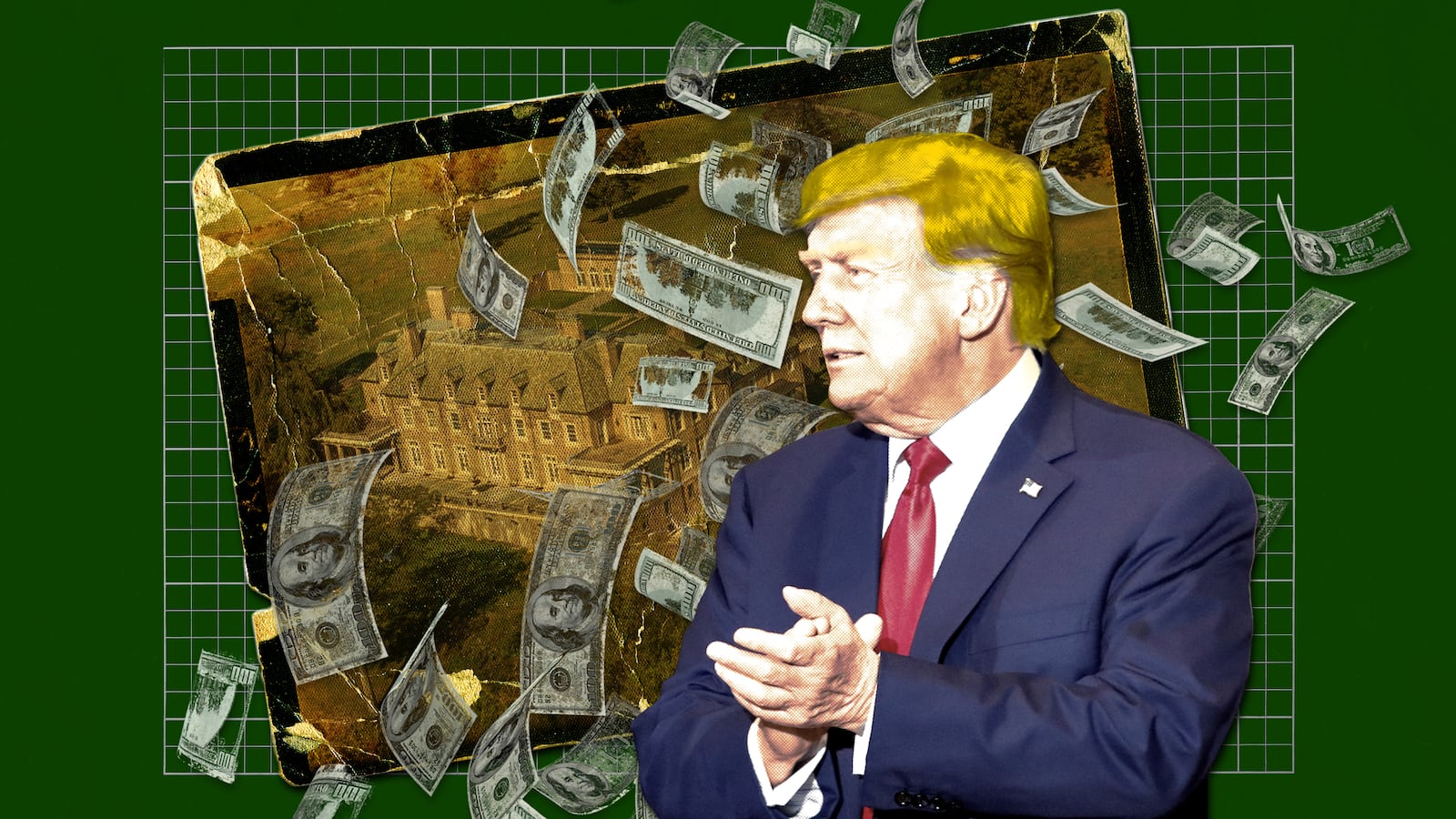The best thing former President Donald Trump ever did with his Batman-like forested estate north of New York City was get a massive tax break—a tax break that’s now under investigation by the state’s attorney general.
According to Trump’s latest financial disclosures, the tax deduction Trump got from reserving the property for conservation—which investigators say reduced his tax bill by more than $3.5 million—still far outweighs the paltry income it keeps bringing him every year. And the whole situation may play right into the hands of the New York attorney general who is going after Trump for inflating his company’s portfolio and using the tax code to bail out failed investments.
Trump's new financial disclosures show that Seven Springs LLC earned him less than $2,500 last year—in the form of a vaguely labeled “rebate.” And yet Trump values the land at more than $50 million, making it even more evident that it’s basically sitting idle, unlike all his other business properties.
Trump has reported no income on that land ever since he started filing these types of federal disclosure forms, which are required for certain executive branch officials.
James Vercammen, a land economist at the University of British Columbia in Vancouver, said Trump is like a rancher who decided it was better for business to just leave his land to nature.
“Many ranchers are earning next to nothing on their farmland, but as soon as they give it up, they get a very generous tax break relative to what they were earning. You’re going to earn a lot more from the tax break than what you’d earn from the land itself,” Vercammen said.
Taken altogether, the numbers highlight Trump’s failure to turn this investment into a money maker while also drawing attention to the relatively lucrative nature of the questionably large tax break he got in 2015.
That’s when the Trumps signed an agreement, called a conservation easement, that handed over rights to the North American Land Trust. The deal gave the nonprofit the power to protect 158 acres of huckleberry bushes, red oaks and sugar maples. An environmental assessment that was part of that deal said the “conservation area provides critical habitat for some of the rarest bat species of the region,” like the little brown bat.
But Trump never intended to create a giant park for black bears, rabbits and white-tailed deer when he bought it for $7.5 million in 1995.
Seven Springs, where the Trump family has a manor that looks like the backdrop to Downton Abbey, is also the site of his years-long development project to build a golf course and several mansions in the mountains that ultimately failed. Locals in surrounding towns vehemently opposed any land development, ruining the real estate tycoon’s dreams of creating yet another haven for rich New Yorkers who live in the burbs and work in the metropolis.
When that didn’t work, Trump opted instead to cash in on the tax break.
But it’s the value Trump placed on that undeveloped land that’s now under investigation by New York Attorney General Letitia James, who sued the Trumps last year and accused them of defrauding banks and insurers. James is seeking to dismantle the Trump Organization and bleed the business dry.
According to the AG’s investigators, Trump’s financial statements vastly inflated the value of the land—to a whopping $291 million in 2014—by assessing it as if there were actually 24 separate lots already developed and ready to go. In reality, that wasn’t even an option.
So when two appraisers at the real estate company Cushman & Wakefield slapped a $56.5 million price tag on the land, Trump was able to claim a $21 million tax deduction by promising not to build on it.
The thinking? Higher land value means a bigger opportunity cost, which comes with a bigger tax reward from the government.
Nancy Assaf McLaughlin, a national expert on conservation easements, was not intimately familiar with the details of Trump’s business deal in Upstate New York. But she said buyers have been increasingly inflating the value of newly acquired land and trying to turn it into a quick profit, essentially flipping forests the way others flip homes.
“There has been an enormous amount of valuation abuse. People will come up with a ‘before value’ that exceeds anything a willing buyer would pay, using ‘subdivision development analysis’ and coming up with a hypothetical subdivision of lots,” she said.
“It has no relation to what somebody would actually pay you for that property on the open market.” said McLaughlin, who teaches law at the University of Utah. “Income tax deduction is inappropriately lucrative in those cases."

Vercammen, the land economist in Canada, stressed that most land owners do this to some degree—and the richest ones who own unique real estate sometimes capitalize on the fact that there’s little to compare it to.
“I think everybody would try to inflate it somewhat. When you get it professionally appraised, you might go back and push for more,” Vercammen said. “A reputable assessor is supposed to look at comparable sales, but that data can be scarce, especially if it’s a peculiar property.”
The Seven Springs estate is but one example of many in James’ $250 million lawsuit, which documents all the ways Trump would reject low property valuations in favor of ones that would guarantee him better bank loans and insurance. Her civil case is scheduled to go to trial in Manhattan in October. The Manhattan District Attorney’s Office, which has run a parallel criminal investigation into the same business practices, has yet to seek an indictment against the former president over inflating real estate values.
One person who observed some of Trump's prior transactions in recent years—and spoke on condition of anonymity—told The Daily Beast that the businessman would regularly spar with appraisers who disagreed with his hyperinflated valuations of his own properties.
“When an appraiser comes back with values that are lower than what Trump wants, he’ll get fired, won’t get paid, or they’ll hire another,” this person said. “He’s extracted the highest possible he can find.”
“He isn’t the only one. The IRS has thousands of cases, a huge backlog of people abusing this. He’s not alone,” said Daniel I. Halperin, a professor emeritus at Harvard Law School.
The opulent castle-like mansion at Seven Springs was initially commissioned in 1919 by Eugene Meyer, ironically the publisher of the newspaper that Trump now loathes: The Washington Post.
While Trump valued Seven Springs at somewhere between $25 million and $50 million in annual federal disclosure forms since 2017, this time around he listed it at over $50 million. That means, in Trump’s view, the property is now as valuable as Cushman appraisers said it was when he still had plans to develop it—even though now he can’t.
Two conservation easement experts told The Daily Beast they found this increase in value a bit odd, given that Trump has already given away rights to develop nearly three-quarters of the land there. However, McLaughlin noted that even restricted land with severe limitations in the fine print will increase in value over time—perhaps decades.







